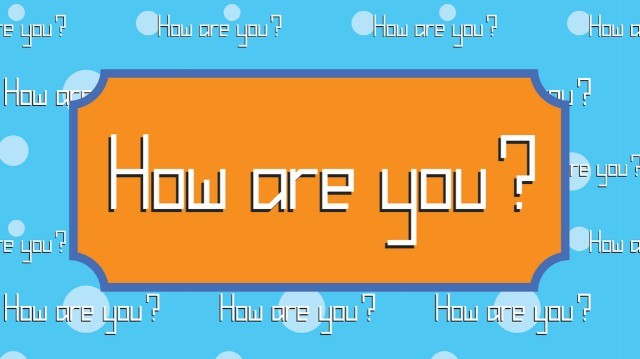Often times when you run into a person that you haven’t seen in a while, you want to catch up on things and ask them how everything is going. Today you will learn how to say “how are you” in Japanese in several different ways.
Take a look at each of these different phrases and read about the context or situations that they are most often used in so that you know the right one to use at any given time.
I’ve tried to provide as much explanation as possible along with some example sentences to help lock them into your memory. Let me know in the comments section if anything doesn’t make sense.
Let’s begin!
Using 元気 to Ask How Are You
One of the first phrases that every Japanese learner comes across is the following.
- お元気ですか?
- ogenki desu ka?
- How are you?
The word 元気 (genki) means “full of spirit; in good health” and is used to refer to both a person’s mental well-being and their physical well-being.
However, one important thing to understand about 元気 (genki) in Japanese is that you really only ask a person this when you haven’t seen them for quite some time.
In America, it’s normal to ask a person how they are doing each time we see them, but in Japan this would be considered a little rude since it means that you’re not really paying attention to how the other person is fairing when you’re with them.
If you see the same person every day, such as at work or school, then it’s expected that you are silently paying attention to their state of well-being during your interactions with them. That means that you don’t need to directly ask them how they are each day.
In Japanese culture, the indirect route is usually the correct one. This is pretty different from American culture where directness is valued.
Using 大丈夫 to Ask Are You Okay
Another pretty common Japanese word is 大丈夫 (daijoubu) and it means “alright; okay” and can be used when asking about a person’s situation.
For example, if you’re talking to someone over the phone or the radio and you hear a commotion on the other end, you can use this word to ask them if they are okay.
- 田中君、大丈夫ですか?
- tanaka kun, daijoubu desu ka?
- Tanaka, are you okay?
Or if you’re talking to a friend and they look like they’ve got a concerned look on their face about something, then you can use 大丈夫 (daijoubu) to ask them what’s wrong.
Related: Other ways to say “what’s wrong” in Japanese.
This is a pretty useful phrase that can also be used in casual situations by dropping the ですか (desu ka) part and simply asking 大丈夫 (daijoubu) with a rising intonation at the end.
Using 気分 and 調子 To Ask About Health

Now there are two new words to learn. The first one is 気分 (kibun) which means “feeling; mood.”
You may have noticed that this word shares the kanji 気 (ki) with the first phrase we learned in this lesson. That’s because 気 (ki) is used to refer to the “mind” or the “spirit” of a person.
- 気分はどうですか?
- kibun wa dou desu ka?
- How are you feeling?
This is a phrase that you would most likely ask if you friend was looking slightly ill. Perhaps they had too much to drink the night before and are a little hungover. Or perhaps they ate the chicken at the restaurant and suspect that it may have been a little under cooked.
- 気分が良くないです。
- kibun ga yoku nai desu.
- I don’t feel well.
In situations like this, you may want to have them visit the doctor.
The other new word to learn in this section is 調子 (choushi) and it means “condition; state of health.”
While this word is not a common one, I have heard it used a couple of times to inquire how a person is fairing. I’ve also heard a girl ask a kitten this phrase while feeding it some milk.
- 調子はどう?
- choushi wa dou?
- How are you doing?
Related: Learn “what are you doing” in Japanese.
Using どう and いかが to Ask How
You may have noticed a word that keeps popping up in these questions. That word is どう (dou) and is used to ask “how” in Japanese.
It actually has kanji that it can be written as 如何 (dou), but it is much more common to see it written in hiragana.
Let’s say that you’re eating lunch with a friend and they take a couple bites out of their meal. You want to ask them how it is, so you say the following.
- どうですか?
- dou desu ka?
- How is it?
So if you want to ask how a specific thing is, such as a person’s health or feelings, then you can use どう (dou) along with words such as 元気 (genki) and 気分 (kibun) to do so.
For example, if you wanted to ask a person how things have been going recently you can do so with the help of the word 最近 (saikin) which means “recently; lately.”
- 最近、どうですか?
- saikin, dou desu ka?
- How have things been?
On the other side of things we have the word いかが (ikaga) which also means “how” in Japanese. It also shares the exact same kanji 如何 (ikaga)!
So what’s the different between these two?
The difference is the formality level. いかが (ikaga) is considered to be more formal and polite, whereas どう (dou) is considered to be more casual and informal.
So you will probably hear いかが (ikaga) used more often when a service person or a store employee asks you how something is, but when you’re hanging out with friends or family you will probably hear どう (dou) used instead.
Now I Want to Hear From You
That’s all for today’s lesson. If you have any questions about the words or phrases that we covered, let me know by leaving a comment down below.
Or if there is just something that you would like to add to the conversation, I want to hear it!
Thanks for reading until the end, and I will catch you next time!
Further Resources for Learning Japanese:
#3 Get My eBook (Secrets to Learning Japanese) for Free

またね!

Hey Nick, great article! In college I took a Japanese history course, and two semesters of Japanese language. So when I saw your article come up, I was intrigued. It’s been many years since college, and your article brought back memories! I like the way you teach Japanese in a concise, fun way. Since Japanese isn’t tonal, like Vietnamese and other Asian languages, it was not too hard to pick up listening and speaking Japanese for me. But, to read it and write it was difficult. Great article and site!!
Hey Eric, yeah I also find Japanese to be a very easy language to pronounce! like you said, it’s the written part that is probably the hardest thing – all those kanji!
That’s pretty cool that your school offered those classes on Japanese. I went to a smaller town college and unfortunately they only taught Spanish and French.
Glad you like the site! (^_^)b
I am aware that in every language, there are words which have few different meanings and the specific response to certain questions. Like Dai Jobu Desu is preferred and more appropriate than Genki Desu. I think it’s important to select the right method of learning languages, like picking up famous phrases in anime but also the conventional Japanese textbooks on grammars as such. I heard that ‘Rosetta Stone-Learning Japanese’ is quite useful. Never tried it but are you aware of this?
Yeah, I actually have used Rosetta Stone’s Japanese program before. I think they’ve got some good things, but a few problems that keep them from being the best.